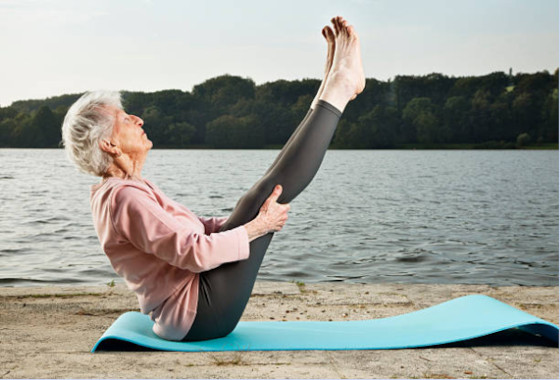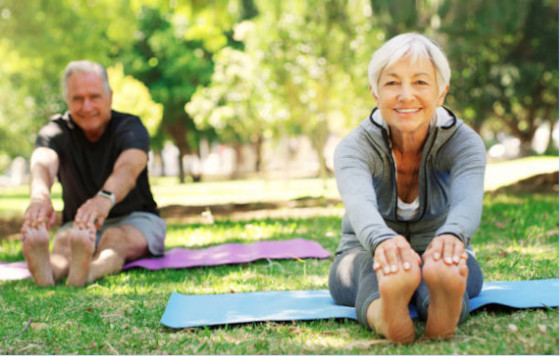The Importance Of Moderate Activity And Biological Youth For Longevity
Story at a glance
- Maintaining “biological youth” is crucial for longevity. Particularly moderate activity, such as walking in a park or forest, and resistance activity (such as hatha yoga postures that engage and strengthen the muscles) for 150 to 180 minutes a week, are a powerful intervention for slowing biological aging.
- Optimal protein intake is about 0.8 grams per kg of ideal body weight. Protein quality matters, with collagen and glycine being especially important but often overlooked nutrients
- Moderate carbohydrate intake (40% to 55% of calories) is associated with lowest mortality risk. Long-term low-carb diets may impair metabolic flexibility and mitochondrial function
- Regular sun exposure is critical for health and longevity. Other key factors include adequate sleep, stress management such as pranayama and meditation, minimizing environmental toxins, and maintaining gut health
 I recently spoke with Siim Land, author of the new book The Longevity Leap, discussing key factors for optimizing health and lifespan. Maintaining “biological youth” is a very important factor for longevity, but the question is how to achieve this as you get older.
I recently spoke with Siim Land, author of the new book The Longevity Leap, discussing key factors for optimizing health and lifespan. Maintaining “biological youth” is a very important factor for longevity, but the question is how to achieve this as you get older.
Land’s book is 500 pages, with 8,000 references, so it’s a good resource to take a deep dive into the strategies that will help keep you biologically young. He’s a leader in the longevity field and walks the walk — he implements the programs he talks about and is an example of taking good care of one’s biology. Chronologically, Land, who lives in Estonia, is 29, but he claims the biological ages of his organs are much lower — 17 years overall, with a 9-year-old liver.
These estimates are based on relatively new epigenetic and biological age tests, which are intriguing, but we don’t yet know if the results translate to longer lifespans. I personally do not put much trust in them. However, Land explains:
“What does it mean if you have a liver of a 9-year-old? Does it mean that you’re going to live exponentially longer than someone else? We don’t have that data yet. I wouldn’t put a lot of emphasis on the tests themselves, much rather I would look at the traditional biomarkers, like glucose, inflammation and those other elements.”
Historically, many mistakes have been made in longevity research, particularly the focus on extreme calorie, carbohydrate and protein restriction:
“The practical outcome would be that you’re eating very small amounts of food and you are becoming very frail and skinny. But in the actual world, we’re starting to see right now that frailty is a huge risk factor for early death and mortality. And malnutrition itself also increases the risk of a lot of different diseases, all-cause mortality and neurodegeneration and heart disease events.
Right now, I think the field has started to appreciate a lot more of these tangible, practical, functional outcomes, like body strength and composition, other biomarkers that move more from the theoretical side of biological aging.”
Optimal Protein and Carbohydrate Intake for Longevity
Land and I agree that most adults need about 0.8 grams of protein per kg of ideal body weight (the weight you would ideally be, not necessarily the weight you are now).
“If you eat too much, then that could be problematic from the perspective of kidney health and homocysteine levels. If you’re eating too little, then that’s the risk of the sarcopenia and frailty,” Land notes. Regarding carbohydrates, we’re also in agreement that low-carb diets are not typically optimal for longevity.
Land cites research showing that moderate carbohydrate intake is associated with the lowest mortality risk.
“With carbohydrates as well, it’s very commonly thought that eating too many carbs is going to be bad for your health. At least in observational studies, it’s the opposite — 40% to 55% of calories as carbohydrates is linked to the lowest risk, usually,” he says.
Land argues that while low-carb diets can be beneficial in the short-term for certain people, long-term carbohydrate restriction may impair metabolic flexibility:
“In the short-term, someone might have pre-diabetes or insulin resistance, then in the short-term, it makes sense for them to maybe control the carbohydrate intake to regain some of that insulin sensitivity. But chronic ketosis, chronic low-carb does impair long-term insulin sensitivity as well.”
Indeed, adequate carbohydrate intake is crucial for optimal mitochondrial function and overall health. It’s the optimal fuel for your mitochondria, but most people don’t consume enough healthy carbohydrates. If metabolically healthy, most adults need 200 to 250 grams of carbohydrates daily as a minimum, while active people need closer to 400 grams. Chronically restricting carbohydrates can lead to increased stress hormone production.
Many people experience initial health improvements on low-carb diets, but these benefits are typically not sustainable long-term. The short-term benefits occur because you’re no longer feeding harmful bacteria in your gut, which decreases the production of endotoxins that can damage your overall health. In the long term, however, if you don’t consume enough healthy carbohydrates, your mitochondrial health will suffer.
While low-carb diets temporarily alleviate symptoms by starving harmful bacteria, they don’t resolve the underlying mitochondrial and gut health issues. A more sustainable approach involves addressing the root causes: improving mitochondrial function, reducing exposure to environmental toxins, including endocrine-disrupting chemicals in plastics and electromagnetic fields (EMFs), and supporting a healthy gut microbiome balance.
The Most Powerful Intervention to Maintain Biological Youth
 When asked how to maintain biological youth, Land states that moderate activity is likely a powerful intervention:
When asked how to maintain biological youth, Land states that moderate activity is likely a powerful intervention:
“Probably a powerful aspect for biological aging is moderate activity. Just maintaining physical activity, it just targets all the hallmarks of aging in a healthy way. It improves all the organ function and it also diminishes the risk of all chronic diseases as well. It targets everything that you need to do when it comes to slowing down biological aging.”
As highlighted in Dr. James O’Keefe’s landmark study, too much vigorous exercise can be detrimental, so finding the right balance is key. We don’t need to go to the gym and do heavy lifting. Daily hatha yoga practice and moderate activity such as walking in a park or forest is very beneficial.
The Importance of Protein Quality and Collagen
It’s not only protein quantity that’s important but also its quality and amino acid balance. Glycine and collagen, which are often overlooked, are among the most important. Land explains:
“Glycine is conditionally essential, not essential, but that’s because your body makes 3 grams of glycine per day. But those 3 grams would be used for important acts, like creatine synthesis. But then you have 12 grams of glycine for collagen turnover, like optimal collagen turnover.”
Most people are deficient, as they’re likely only consuming 0 to 1 gram of collagen protein daily. About one-third of total body protein is collagen, so it’s crucial to consume adequate collagen, from foods like citrus fruits, berries, leafy greens, nuts and seeds, or even by taking natural vegan collagen supplements.
As for protein, great sources are buckwheat, hemp seeds, pollen, edamame, pulses, as well as ecological eggs and yogurt.
The Prevalence of Insulin Resistance and Metabolic Dysfunction
The homeostasis model assessment of insulin resistance (HOMA-IR) is a test discovered in 1985, which is the gold standard for measuring insulin resistance. If you use HOMA-IR data, up to 99% of the U.S. population may have some degree of insulin resistance. Using this test is a simple way to assess your metabolic health.
You can figure out your HOMA-IR using two simple tests — your fasting blood glucose, which you can do at home, and then a fasting insulin level, which is an inexpensive test. Multiply those two numbers, and if you’re in the U.S., you divide by 405, and if you’re in Europe you have different units than the US and need to divide by 22. If the result is below one, you’re not insulin resistant. The lucky less than 1% of the population does not have insulin resistance.
Land agrees this is a useful marker, while also emphasizing the importance of looking at multiple biomarkers to assess metabolic health.
The Importance of Sunlight and Vitamin D
We also discussed the critical importance of sunlight exposure and maintaining optimal vitamin D levels. Land, who lives in Estonia at a high latitude, maintains his vitamin D levels through a combination of sun exposure when possible, diet and supplementation when needed.
Sun is one of the most important factors for longevity. I think it’s almost biologically impossible to be healthy if you don’t have enough sun exposure. One way to help compensate, if you live in an area where year-round sunlight exposure isn’t practical, is using topical lanolin.
If you put lanolin on your skin before going in the sun, it will enhance vitamin D production from sunlight and helps reduce skin drying, cracks, wrinkles and fissures, so it’s especially useful if you’re concerned about photoaging.
Practical Recommendations for Longevity
By focusing on foundational aspects of health — from mitochondrial function and gut health to moderate activity and nutrient balance — you may be able to significantly improve your long-term health outcomes.
As research in longevity science continues to evolve, it’s clear that a proactive, comprehensive approach to health is crucial. Rather than seeking a single magic formula, the path to longevity appears to lie in the consistent application of efficient health routines, regular self-monitoring and spiritual practice.
Author: Dr. Joseph Mercola
yogaesoteric
July 31, 2024
